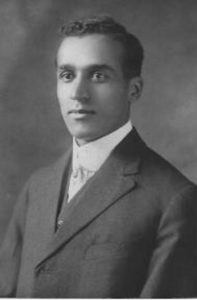
Numa Adams
*Numa Adams was born on this date in 1885. He was a Black doctor, educator, and administrator.
Numa Pompilius Garfield Adams was born in Delaplane, Virginia. He received his early education at a country school run by his uncle, Robert Adams. His grandmother, Amanda Adams, was a midwife who assisted Dr. Green in delivering babies. She shared her knowledge of herbal medicine with Dr. Green, which inspired his scientific interest in collecting herbs. When Adams was thirteen, his family moved to Steelton, Pennsylvania, where he bought a second-hand cornet, and he learned to play with the help of a storekeeper.
His musical skills allowed him to play in orchestras such as the Lyric Orchestra and Louis Brown's Orchestra to help pay for high school, college, and medical school tuition. Adams attended public school in Steelton, Pennsylvania, and graduated high school in 1905. In 1907, he left the state to enroll at Howard University in Washington, D.C. In 1911, he received a B.A. degree magna cum laude from Howard. A year later, he received an M.A. degree in chemistry from Columbia University, and in 1924, he received his M.D. from the Rush Medical School of the University of Chicago.
Adams' teaching career began after he graduated high school. He spent a year substitute teaching in Steelton, Pennsylvania, then taught seventh grade for a year in Carlisle, Pennsylvania. After earning his master's degree in chemistry, the following year, he sat on the faculty board of the chemistry department at Howard. By 1918, he had progressed from assistant to associate professor. In 1919, Adams decided an education in chemistry was insufficient for his career and resigned as chair of the chemistry department to pursue a medical degree.
After graduating from medical school, he interned in a St. Louis, Missouri hospital. He also taught neurology and psychiatry to nursing students at Provident Hospital. Adams married Osceola Macarthy, one of the founders of Delta Sigma Theta. Numa was a member of the Alpha Phi Alpha Fraternity, Beta Chapter. He served as assistant medical director of the Victory Life Insurance Company from 1927 to 1929. In 1929, he was made a dean of Howard University, the first Black dean at the Howard University School of Medicine. As dean, Adams significantly changed the curriculum at Howard University. He hired highly trained professors by offering generous starting salaries.
He increased the acceptance standards for students to the university. His claim of educating students to their highest potential was proven true as no student failed annual board examinations. In his final years as dean, he proposed the integration of Howard University and Freedman's Hospital. In 1937, the department secretary performed an analysis that supported the prospective merger. After some initial protest, primarily from the city's Medico-Chirurgical Society, the transfer was completed in 1940.
In addition to his positions as dean at Howard University School of Medicine and the Provident Hospital School of Nursing, Numa Adams served as a member of the National Medical Association, the board of directors of the Tuberculosis Association of the District of Columbia, the Advisory Health Council of Washington, the Council on Social Agencies, and the Cook County Physicians Association in Illinois. He was a fellow of the American Association for the Advancement of Sciences. Numa Adams died on August 29, 1940.